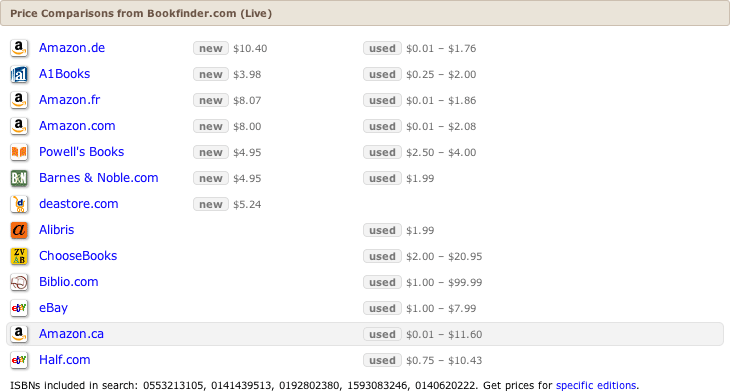This post does not discuss what I consider what may be the most innovative and promising new feature, Local Book Search. I’ll get to that in the morning. (See it in action.)
Over the night we added a small avalache of features (for a list of Talk posts, see the top of this post.) This post talks about the “Get this book” feature.
Show me the feature! Check the Get this Book feature for Romeo and Juliet. Then come discuss this here.
 Why the new features? For years now we’ve had a feature called “Buy, Borrow and Swap”—involved bookstore and library links, and integration with swap sites.
Why the new features? For years now we’ve had a feature called “Buy, Borrow and Swap”—involved bookstore and library links, and integration with swap sites.
Two things moved us replace this feature:
- We wanted to make it better—to integrate with as many sources as possible, so we show people what was out there, and send people to links that existed, not a lot of blind links to pages that might or might not exist. First, as discussed here, Amazon tightened up its linking policy, forcing changes.
- Amazon required it. As a site that uses Amazon data (although we also use some 690 other sources), we had to follow their rules, which required us to drop links to competitor sites, except on secondary pages. We didn’t want this to be a net loss for the site, so we decided to make the best secondary pages we could imagine. (Three programmers kept imagining for two months straight, and this is what came out.)
The new pages are accessible from any work page, and are pictured at the right.
Ebooks. Another book site integrated with a single attractive, but not comprehensive ebook supplier. So we decided to integrate with fourteen. We’ve included both pay sites (Kindle, Sony Reader) and free sites (Project Gutenberg, Hathi Trust).

Not pictured:

The integration is deep. For Hathi alone, we’ve linked 398,000 LibraryThing works, and OpenLibrary adds another 178,000 full scans. Because our catalog is so vast, and our data so “ratty” (it comes from over 690 source), LibraryThing can do a lot better than parsing ISBNs. This is how we connect to so many ISBN-less sources. My favorite is the Online Books Page, which collects links to some 30,000 books found here and there online, mostly one-off scanning projects at universities and the like.
There are, of course, more. We’re not parsing Barnes and Noble ebooks—which will become important if the “Nook” takes off. If you don’t see your favorite source, let us know. We’ll work to add it.
Audiobooks. I haven’t taken to ebooks yet. (For starters, my reader is broken.) But I listen to a lot of audiobooks. For people like me we’ve added links to three audiobook suppliers—Audible, iTunes and the wonderful, free, amateur-driven project LibriVox.

Live Price Comparison from BookFinder.com. Many of you use the price-comparison site BookFinder.com, so, with their help, we decided to integrate a good piece of it into the site itself. BookFinder reaches out to dozens of new and used booksellers, and comes back with good deals and rare buys.

Live results are a core principle of the site, so caching is for as little time as possible. The results are also distinguished by being cross-edition—a fairly new concept in price comparison. You can change the ISBNs or titles BookFinder uses, to get price-comparison that fits you best.
Swap sites. Swap-site integration has been with LibraryThing for some time now. We’ve spiffed it up, and added a long-missing site, PaperBackSwap.com. As a lot of members belong to more than one site, gathering them all together like this should be valuable.

All Sources. “Get this book” are just the best slices of a much larger pie. Check out All Sources (here, for Romeo and Juliet) to get all the sources. As with other parts of the site, the data is fundamentally under your control. If you don’t see your favorite bookseller or book database, go ahead and enter it. We also want help improving the data.
Your Quick Links area is editable. To edit it, check out Edit Quick Links, which looks like “All Sources,” but works a little different.
What’s missing. Here’s how we plan to improve the page, and how you can improve it too.
- Members need to be able to add new ebooks.
- We need more ebook sources. Seventeen is great. There are probably thirty we should have.
- A lot of sources need improvement; they don’t have all the link types they could have.
- We have second slate of “book database” integrations coming up, including a full conversion of all Wikipedia citations.
Come talk about the new features here.






 Why the new features? For years now we’ve had a feature called “Buy, Borrow and Swap”—involved bookstore and library links, and integration with swap sites.
Why the new features? For years now we’ve had a feature called “Buy, Borrow and Swap”—involved bookstore and library links, and integration with swap sites. 




 I’ve just added a new swap site,
I’ve just added a new swap site,  Some time ago, we decided NOT to get into the swapping game ourselves, but to integrate with sites. Almost all sites have met
Some time ago, we decided NOT to get into the swapping game ourselves, but to integrate with sites. Almost all sites have met 



